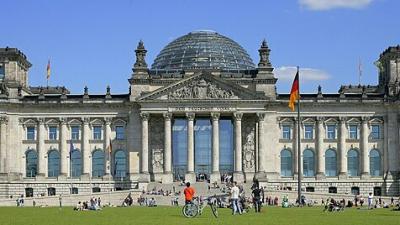German Christian Democracy is not only a national player, but also a European one. For a long time, it was an example of a living fossil since confessional parties have long outlived their usefulness in the rest of the West. The current crisis of the Christian Democratic Union raises the question whether the CDU is also facing a path similar to that of the Italian Democrazia Cristiana.
Therefore, CDU’s fate has been from the outset also a political issue with importance extending beyond Germany. Although the party has long since emancipated itself from almost all the views of its legendary founding father, the idea of united Europe still lives on in obscure ways. Admittedly, with the secularisation of both Europe and Christian democracy, nothing remains in the Union of the hot idea of a Western and Christian Europe in the form of a modernised remake of the Carolingian Empire. Chesterton coined the well-known saying that when people no longer believe in Christ, they no longer believe in nothing, but believe in all sorts of things. So Christian Democracy, too, confuses belief in a united Europe with belief in the Brussels bureaucracy. It has begun to replace culture with a self-constructed politics that finds its manifestation in the Brussels Moloch. Theologically speaking, it thus adheres to an idolatrous cult that no longer focuses on the actual idea of Europe, but on the political organisation it has achieved, called the European Union.
However, this also brings to the fore the explosive nature of the CDU's weakness. It is the real German pillar of the European Union. After the war, the Social Democrats first emphasised a national policy, and later pursued an Eastern policy that was more interested in a balance between East and West than in the actual European project. This line of tradition could even still be seen in the Schröder era and in foreign ministers like Frank-Walter Steinmeier. Basically, the SPD can do little with the primarily Catholic idea of Europe. Like the Greens, they see it primarily as an advantageous structure for advancing statist and centralist ideas, or for playing issues over Brussels' fence that can be implemented at home afterwards. The secular emptying in favour of neo-leftist, "woke" ideals suits the leftists, who thus de facto want to establish a new EU-wide ideology that has long since displaced the old idea of Europe.
Like at the national level, the CDU has run this programme far too often at the European level. In Germany, it has almost always sided with the left-dominated zeitgeist, including shutdown of nuclear power or "energy turnaround", extension of marriage to homosexuals (marriage for all), opening of borders for unlimited mass migration and promotion of "transport turnaround", with accompanying abolition of the combustion engine. The 16 years of Angela Merkel, during which the CDU/CSU did everything possible except for pursuing policies benefiting its own electorate, are now being avenged all the more bitterly.
For years, the Union was able to cover up its lack of content and the open betrayal of its ideals with the nimbus of the chancellor. Merkel was much more popular with the green-savvy milieus of journalists and opinion makers in Germany than with many Christian Democrats. But Merkel's course of taking up the media mood and making policy on that basis protected her for years, so that there was also a conviction among the people that Merkel not only guaranteed security and stability, but was de facto without alternative. This is the paradox of the CDU: the woman who was responsible for the complete emptying of the CDU (in terms of personnel as well as content) was at the same time the only card that the CDU could use to get votes at all. The CDU subordinated itself to Merkel and thus became the Merkel party. The moment Merkel was gone, the façade crumbled - and the party stood naked.
To give a telling example of Merkel's "false success": in 1998, the CDU/CSU with its then chancellor Helmut Kohl suffered a resounding electoral defeat. It received only 35.1 per cent. To this day, the German press celebrates the CDU result of 2013 as Merkel's greatest electoral success: 41.2 per cent. But in absolute second votes - in Germany the second vote goes to the party, the first vote to the direct candidate - this triumphant election victory was much more modest than the media portrayed it. In 1998, Helmut Kohl's CDU received around 14.1 million votes, while its sister party, the CSU, came in with 3.3 million votes. In 2013, the CDU took 14.9 million votes, and the CSU 3.2 million. In absolute terms, therefore, the CDU/CSU made only slight gains. Rather, the "election victory" was due to that notorious "mildew" of Merkel's term in office, which ensured with asymmetrical campaigning that as many voters as possible stayed at home and that the CDU/CSU was the winner among the losers. In other words: even at its zenith, the base on which the Merkel CDU's success stood was shaky.
To stick to bare figures: in the last federal election, the CDU only achieved 8.7 million second votes (CSU: 2.4 million). The trend that the age of the people's parties is over certainly also plays a role here - German social democracy is hardly doing better. But there are specific tendencies that are making it particularly difficult for the Union at the moment. The incumbent left-wing federal government under Social Democrat Olaf Scholz would be a fitting target to make up for lost ground; the "traffic lights" coalition is already considered a mishap. In order to try a "new beginning", the CDU has elected a new party leader, Friedrich Merz, who is considered an old Merkel opponent within the Union itself. At the same time, the Christian Democrats have recently appointed Carsten Linnemann as secretary-general. He is no friend of Merkel and comes from the Union's middle-class association – which is a part of the party that has been particularly neglected in the Merkel era. Actually, the signs would be good for the Union.
But despite setting the course and a federal government that provides favourable templates for opposition work, the CDU may fail to emerge from its low. Merz is seen as a ditherer. He does not want to alienate Merkel’s supporters who are still strongly represented in the party. Merz has let issues such as the debate on a ruinous heating law, which burdens millions of German homeowners, pass by; the CDU itself did not want to stop the law, but merely to soften it somewhat. In a similar way, the CDU has let one left-wing project after another pass through the Bundestag - nasty tongues commented that they did not want to alienate possible future coalition partners. The CDU is in opposition, but sees its role as merely governing in reserve. Despite the numerous political moments when this would have been possible, it has not set any accents. From within its own ranks, Merz has even heard the accusation that he is idly watching the left-wing government turn Germany into a "re-education camp" or even indirectly helping it happen.
Linnemann, the second hopeful, has so far also deceived those Christian Democrats who hoped for an end to the Merkel era. Instead of seeking confrontation with the federal government, he is reaching out to it to take joint action against the AfD. He duped the CDU mastermind Andreas Rödder when the latter dared to at least think about indirect cooperation with the AfD. All in all: even two years after the end of the Merkel era, no one dares to come to terms with the legacy of the years that were so painful for the CDU and to convey to the voters that it is now taking a new course. On the contrary, there is even a threat that some Merkel supporters will be able to assert themselves in the party in the long term to manifest the orientation to the left and make joining forces with the Greens and the SPD the rule.
What would be needed to prevent this would be a clean reappraisal and turning away from the figure of Angela Merkel. Once before, the CDU/CSU was on the brink of the abyss, caused by a donation scandal involving Helmut Kohl. At that time, the CDU was threatened with the fate of the Italian Democrazia Cristiana. The Union was only saved by completely distancing itself from Kohl and the CDU leadership of that time - including a stab in the back from a close confidante to get rid of Kohl for good. The fact that the confidante was of all people Angela Merkel herself, and that no one now dares to launch this stab in the back, may ultimately be the CDU's undoing.
Read also
The German migration policy does not want to grow up - yet
It is not only regarding energy policy that Germany remains in a Peter Pan mode for the time being: several events this month have revealed that Berlin, despite its immense burdens, is reluctant to push through a more pragmatic and far-sighted immigration policy.
Marco Gallina
The German government wants to throw two opposition parties out of parliament
On 17 March, Germany carried out what was possibly the most significant change in electoral law in the post-war period. It was also especially remarkable because a government with an absolute majority could thus eliminate two opposition parties, at least in the medium term.
Marco Gallina
The Catholic Church in Germany is in a worse situation than in 1517
The Archbishop of Cologne is one of the most important representatives of the Catholic clergy not only in Germany, but worldwide.
Marco Gallina
Country report: Germany, July - How the German government tried to undermine parliament
The traffic light government consisting of Social Democrats, Greens and Liberals had wanted to push the "heat turnaround" through the German parliament by brute force.














Comments (0)